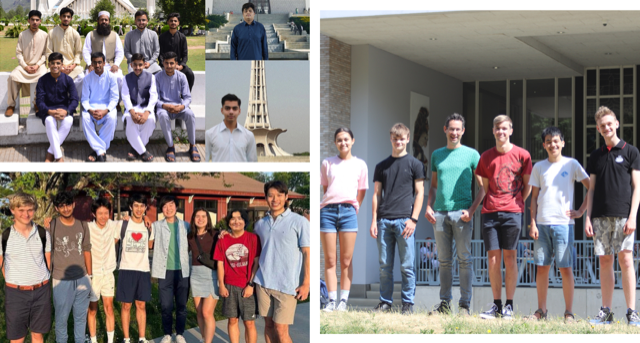Geneva and Hamburg, 28 June 2023. In 2023, for the second time in the history of the Beamline for Schools competition, the evaluation committee selected three winning teams. The team “Myriad Magnets” from the Philips Exeter Academy, in Exeter, United States, and the team “Particular Perspective”, which brings together pupils from the Islamabad College for Boys, the Supernova School in Islamabad, the Cadet College in Hasanabdal, the Siddeeq Public School in Rawalpindi and the Cedar College in Karachi, Pakistan, will travel to CERN, Geneva, in September 2023 to perform the experiments that they proposed. The team “Wire Wizards” from the Augustinianum school in Eindhoven, Netherlands, will be hosted at DESY (Deutsches Elektronen-Synchrotron in Hamburg, Germany) to carry out its experiment.
Beamline for Schools (BL4S) is a physics competition open to secondary school pupils from all around the world. The participants are invited to prepare a proposal for a physics experiment that can be undertaken at the beamline of a particle accelerator. A beamline is a facility that provides high-energy fluxes of subatomic particles that can be used to conduct experiments in different fields, including fundamental physics, material science and medicine.
BL4S started in 2014 on the occasion of the 60th anniversary of CERN. Following the success of the first edition, the competition continued, reaching its 10th edition in 2023. Since 2014, 22 teams have been awarded as winners in BL4S, while more than 16 000 pupils from all over the world have taken part in the competition. The participation rate has been rising consistently for the past few years, and this year, 379 teams from 63 countries submitted an experiment proposal.
“Congratulations to this year’s winners – may they have good beams, collect interesting data and generally have the time of their lives,” says Christoph Rembser, a CERN physicist at the ATLAS experiment and one of the founders of Beamline for Schools. “Every year I am astonished by how many young people submit very creative, interesting proposals. In 2014, we weren’t sure at all whether this competition would work. Ten years and 16 000 participants later, I am proud to say that it is obviously a resounding success.”
The fruitful collaboration between CERN and DESY started in 2019 during the shutdown period of the CERN accelerators. This year, the German laboratory will host its fifth team of winners.
“I am amazed that this time a record number of nearly 380 applications from school teams worldwide was received! It is fantastic that so many young people are interested in doing hands-on research at our laboratories,” says Beate Heinemann, DESY Director in charge of particle physics. “DESY is very happy to be part of this endeavour together with CERN, and to offer its test beam this year to a team from the Netherlands.”
Preparing a proposal for a particle physics experiment is a very challenging task for secondary school pupils but, when provided with the right support, the participants design very creative experiments. The “Myriad Magnets” team from the United States plans to build and test a permanent magnet with the Halbach geometry that can be configured to produce a dipole or a quadrupole magnetic field.
“BL4S supported us to directly explore and apply new skills, particularly in the intersection of physics and engineering. It is hard to find challenging and intellectually fruitful opportunities that tackle research in both; BL4S filled this gap, and we look forward to continuing to build on these areas at CERN and in the coming years,” says Isabella Vesely, one of the “Myriad Magnets” pupils.
The Pakistan team “Particular Perspective” will measure in detail the beam composition of the T10 beamline of the CERN Proton Synchrotron accelerator. The experiment set-up they designed will make it possible to differentiate between different particle species and measure their intensity.
“I am grateful to BL4S for having provided me with an opportunity to represent my country, Pakistan, and its budding community of aspiring physicists. This is a chance for us to experience physics at the highest level and will inspire people with interests similar to ours to reach greater heights,” says Muhammad Salman Tarar from the “Particular Perspective” team.
The “Wire Wizards” team’s experiment focuses on detector development. The Dutch students designed and built a multi-wire proportional chamber (MWPC), a gas detector able to measure the position of a particle interacting with it, and they plan to characterise it using the electron beam available at DESY.
“The BL4S competition provides us with a unique educational experience that will be a highlight in our time as students,” says Leon Verreijt from the “Wire Wizards” team.
The winners have been selected by a committee of CERN and DESY scientists from a shortlist of 27 particularly promising experiments. All the teams in the shortlist will be awarded special prizes. In addition, one team will be recognised for the most creative video and 10 teams for the quality of physics outreach activities they are organising in their local communities, taking advantage of the knowledge gained by taking part in BL4S.
Beamline for Schools is an education and outreach project funded by the CERN & Society Foundation and supported by individual donors, foundations and companies and, for this 10th edition, notably by ROLEX through its Perpetual Planet Initiative and the Wilhelm and Else Heraeus Foundation.
Further information:
- BL4S website: https://beamlineforschools.cern/
- 2023 edition: https://beamlineforschools.cern/editions/2023-edition
- Shortlisted teams in 2023: https://beamline-for-schools.web.cern.ch/sites/default/files/BL4S_2023_shortlist_video_outreach.pdf
- Previous winners: https://beamlineforschools.cern/resources/winners
- Countries represented among the shortlisted teams: Antigua & Barbuda, Bangladesh, Brazil, Canada, Costa Rica, Finland, France, India, Italy, Japan, Mauritius, Netherlands, Pakistan, Romania, Spain, Türkiye, United Kingdom, United States.
- The prizes awarded for the best outreach project have been kindly provided by the Belgian project “Stars Shine for Everyone”.

